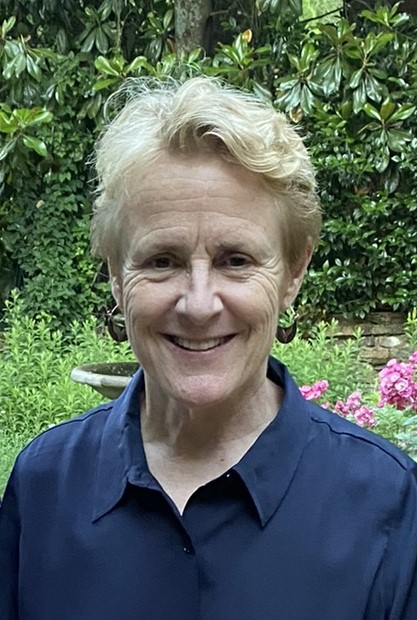2025 Fellows
Cathy Pringle
Dr. Catherine Pringle is a Distinguished Research Professor Emerita at the University of Georgia’s (UGA) Odum School of Ecology (OSE) where she specializes in the study of freshwater ecosystems and conservation ecology. Her research focuses on species-community-ecosystem linkages, effects of disturbance on freshwater ecosystems (particularly streams), and the role of hydrologic connectivity in shaping ecosystems within landscapes. She received a Ph.D. from the University of Michigan in Ann Arbor, followed by post-doctoral positions at the University of California at Berkeley, UC Santa Barbara, and Cornell University. Dr. Pringle joined UGA in 1993 and served as the Chair of OSE’s Conservation Ecology &; Sustainable Development Graduate M.S. Program from 1993-2020. She served as past president of the Society for Freshwater Science, and is a Fellow of the American Association for the Advancement of Science (AAAS).
Dr. Pringle’s research contributions include 200 refereed journal articles, three co-edited books, and over 50 book chapters and symposium proceedings. She served as the lead investigator (1985-2016) on the long-term STREAMS research project in Costa Rica (NSF-LTREB) and contributed to two NSF-funded long-term ecological research (LTER) projects as senior personnel: the Luquillo LTER Project, Puerto Rico, and the Coweeta LTER Project, North Carolina. She served as a co-PI on the NSF-TADS (Tropical Amphibian Declines) Project in Panama, which focuses on the response of tropical stream ecosystems to frog (tadpole) extirpation. She also served as a co-PI on a collaborative NSF-FIBR Project in Trinidad that examined how ecological and evolutionary processes interact in nature. While most of Pringle’s tropical research has been in the Caribbean, she and her graduate students have also conducted studies in Madagascar and Kosrae, Micronesia.
A total of 23 PhD and 22 MS students have graduated from Dr. Pringle’s laboratory. Lab alumni have gone on to work in government (EPA, USGS, U.S. National Park Service), the not-for-profit sector (The Nature Conservancy, Children’s Rainforest), and academia (thirteen alumni are professors or in tenure-track positions).
Selections from Cathy's Fellows nomination and letters of support:
“As past students of Dr. Pringle, we feel her contributions to our field and the conservation of aquatic resources have not yet been fully recognized. Dr. Pringle retired from the University of Georgia as a Distinguished Research Professor after almost 30 years of service. An over-arching goal of Dr. Pringle’s research was to link theory with the practice of conservation through resource management applications, environmental outreach, and/or synthesis activities. Dr. Pringle trained 24 PhD students, 22 master’s students, and five postdoctoral researchers. Many of these students have gone on to successful careers in academia (thirteen alumni are professors or in tenure-track positions), the federal government (EPA, USGS, U.S. National Park Service), and non-governmental organizations (The Nature Conservancy, Children’s Rainforest). Her past trainees include two past presidents of SFS and the current Editor-in-chief of the Society’s journal. Dr. Pringle was a demanding but supportive mentor.”
“Dr. Pringle has a long history of participation and service in our Society. She played a key role in promoting the inclusion of conservation topics at a time when the main focus was on basic research. Dr. Pringle chaired or co-chaired the Conservation and Environmental Issues Committee from 1991 to 1999. The committee was the first to promote active discussion on freshwater conservation within our society. Dr. Pringle [later served as] president of SFS in 2003.”
“Dr. Pringle has published over 230 peer-reviewed papers, book chapters, and three edited books. According to Google Scholar, Dr. Pringle’s work has been cited over 27,000 times, and has an h-index of 82 and an i-10 index of 208. Her ovarian (as she would call it) papers on patch dynamics in streams (JNABS 1988), and hydrologic connectivity and biological reserves (Ecological Applications 2001) are still being widely cited and used. Dr. Pringle developed the electric exclosure technique, which has been widely used in stream ecology to examine top-down effects in food webs, for which she received UGA’s Creative Research Medal. Pringle’s papers describing or using this technique are well cited, with over 200 citations each.”
“Through her impactful publications and large number of trainees, Dr. Pringle’s waves will continue to influence the Society for Freshwater Science, and the field of stream ecology for a long time. We feel she is well deserving of the recognition of being a Fellow of the Society for Freshwater Science.”
"I simply cannot overstate how important Cathy’s support has been to me. Cathy is not a boastful or arrogant colleague. I doubt many, if any, of the current UGA Ecology faculty are aware of her standing in the academic world, whether measured by impact factor or national and international outreach. She retired entirely without fanfare. I hope that this commitee chooses to recognize Cathy as a Fellow of the Society."


